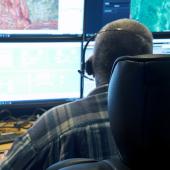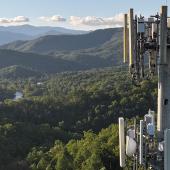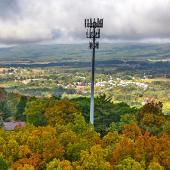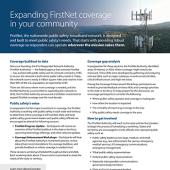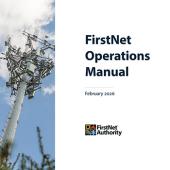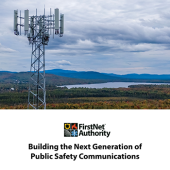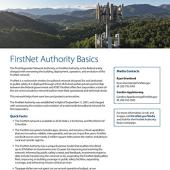First Responder Network Authority (FirstNet Authority) 9-1-1/Emergency Communications Expert John Hunt has more than 35 years of experience working with public safety communications technology. He worked at AT&T and Regional Bell as a 9-1-1 product manager, and served as OnStar’s 9-1-1 public policy manager. He was appointed by the Governor of Michigan to serve on the State 9-1-1 Committee for 25 consecutive years.
We caught up with John to discuss the evolution of 9-1-1 and emergency communications technology, how Next Generation 9-1-1 will benefit telecommunicators, and the value FirstNet brings to emergency communications centers.
How did you see communications tools and methods change during your career?
Hunt: When I first began working with 9-1-1 systems, the technology was rudimentary. 9-1-1 as a three-digit number was only a few years old, and the ability for members of the public to use 9-1-1 was still rolling out across the country. As the technology marketplace evolved, we modified that national 9-1-1 system on several occasions.
Enhanced 9-1-1 was the first major improvement to the system, allowing telecommunicators to have automatic access to the name, address, and phone number of the caller. That led to the ability to have wireless calls and involved technology and operational changes at the emergency communications center (ECC) level. Today, with the promise of Next Generation 9-1-1 (NG911), we will have the ability to do some amazing things compared to what has been possible in the past. In my career, I’ve seen technology move from the Stone Age to the Space Age, and it will continue to evolve with NG911 and FirstNet.
What made you want to work with the FirstNet Authority?
Hunt: I was aware of FirstNet before it was FirstNet. Before the legislation was passed, I began to hear about a nationwide network for public safety. And when the FirstNet Authority was created in 2012, I was excited. The mission of the organization always interested me, and because I spent more than 30 years watching public safety communications technology grow and evolve, I saw this as the next big step.
While I never had the opportunity to serve as a first responder, I worked very closely with public safety for my entire career. The desire to work with and serve those who serve and protect us is in my DNA now. I knew I wanted to be a part of FirstNet and the FirstNet Authority to help advance new technologies that would enable public safety to carry out their jobs more quickly and efficiently.
Where do you see FirstNet having the greatest impact for emergency communications center personnel?
Hunt: ECCs are currently working towards a transition to NG911. NG911 will give ECCs the ability to accept multimedia data, like video, pictures, and texts, from the public. In turn, telecommunicators will be able to share that information with responders heading to or on scene, giving them greater situational awareness into the incident. That’s where FirstNet comes in – the network can be used to enable two-way communication between the telecommunicator and the police officer, firefighter, or emergency medical technician who is servicing the call for help.
Many ECCs are using FirstNet today for this two-way communication. Telecommunicators are able to forward information to devices in the field that is being generated by the ECC’s computer-aided dispatch system. And, those responders in the field can send newly generated information back to the dispatchers. This communication ability complements land mobile radio and other traditional voice communications systems, giving public safety another option to relay important details without tying up radio resources.
FirstNet provides value to ECCs today, and that value will be amplified with the implementation of NG911. When ECCs can send and receive multimedia, they will need the ability to pass that along without concerns of network congestion, bandwidth limitations, or security. FirstNet’s priority and preemption will ensure that data gets to the people who need it most – whether they’re in the ECC or in the field.
In your role as the FirstNet Authority’s 9-1-1/Emergency Communications subject matter expert, how do you work with public safety?
Hunt: I have been a member of APCO and NENA for 35 years, and I meet with public safety at conferences, webinars, and meetings to answer questions and share information about FirstNet. At the FirstNet Authority, we host events to bring together emergency communications professionals to solicit information about how they are using the network and how FirstNet could best meet their needs.
I work with a team at the FirstNet Authority that is focused on 9-1-1 and emergency communications. My colleagues bring incredible insight as they all have experience and careers working directly in ECCs. As a group, we want to be able to talk to the ECC directors, supervisors, and actual users of the equipment and technology to hear how it is being used for public safety communications today.
Part of our responsibility from the legislation that created the FirstNet Authority is to not only oversee the deployment of FirstNet, but also ensure it evolves to continually meet the needs of public safety. Hearing directly from users in the field is the best way for us to fulfill that responsibility.
FirstNet belongs to public safety, and the FirstNet Authority’s job is to help ensure it will evolve in the future to continue to meet those needs. To share your feedback or ask a question about FirstNet for emergency communications, contact John Hunt, Senior 9-1-1/Emergency Communications Advisor, at John.Hunt@firstnet.gov or call 202-430-2168.
You can also sign up for John’s 9-1-1 Take newsletter, or visit our page for 9-1-1/emergency communications.













